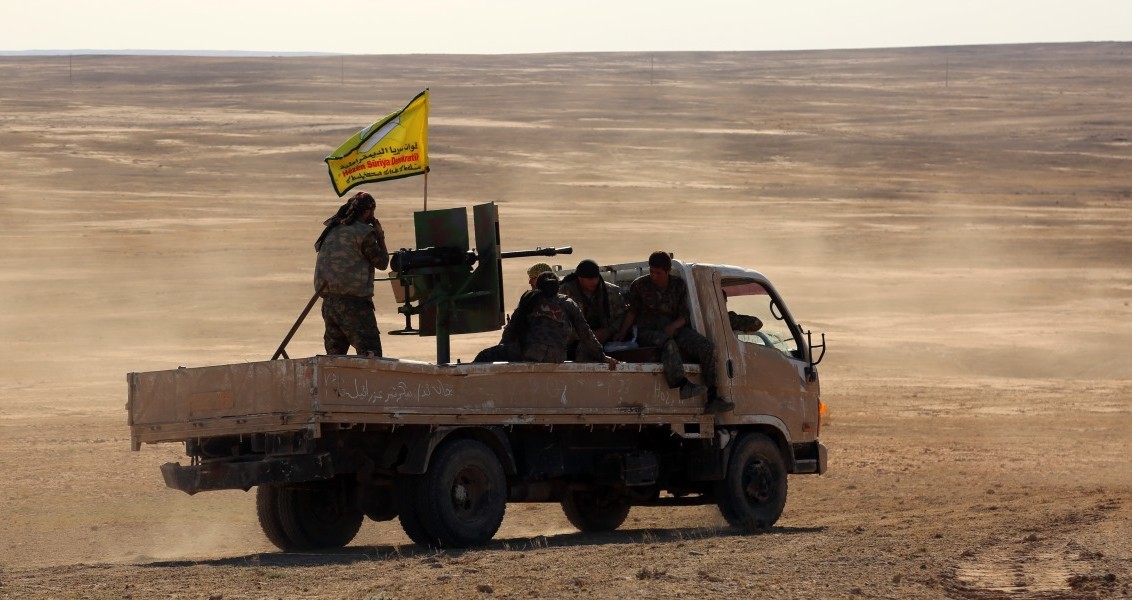On Wednesday, Defense Minister Fikri Işık met with U.S. Secretary of Defense James Mattis in Brussels. One of the crucial points of the meeting was the U.S.’s support for the PKK Syrian affiliate Democratic Union Party’s (PYD) armed People’s Protection Units (YPG). Responding to Ankara’s disapproval, Mattis replied to Işık saying: “This relationship with the YPG isn’t one of choice. It is out of necessity and is a temporary, short-term relationship.”
U.S. President Donald Trump’s administration’s YPG policy mirrors former President Barack Obama’s approach, basically because those directing U.S. policies on Syria have remained the same. With the Raqqa operation, Trump demonstrated that he would continue “regarding the YPG as a strategic piece in the struggle against Daesh”, despite Turkey’s disapproval of the support and the fact that a stronger YPG threatens Turkish national security. Despite the opposition, the U.S. administration continues to insist on its policy. The rhetoric of let’s support the YPG and mollify Turkey formulated during the Obama era is unfortunately still going on today. As a result of its support, the U.S. is arming the YPG with heavy weapons while also providing intelligence and air protection to YPG forces in the field. As a result, the U.S. provides the group with both physical and symbolic protection.
Parallel to aiding the YPG, the U.S. is also attempting to mollify Turkey. In the Trump’s meeting with President Recep Tayyip Erdoğan this past May, the U.S. president made attempts to deliver a message of no need to worry. In fact, the U.S. confirmed that the distributed weapons would be collected in the end, and upon request, a list of the arms could be provided. Additionally, the U.S. stressed that the YPG was not being supported in its efforts to gain territory but rather supported in the fight against Daesh. In response to this, Erdoğan reminded them of the promises made about the YPG during the Obama era. This included the YPG settling in Aleppo, despite the U.S.’s assurance that the YPG would immediately leave Manbij, and emphasized that although the YPG would only be supported in its fight against Daesh, the group was being allowed to establish its own area of hegemony in liberated areas. During the meeting, Erdoğan asserted that the minute the YPG made a move toward Turkey’s southern border, it would be regarded as a threat and strong force would be used against it.
The Turkish Armed Forces (TSK) has been targeting YPG positions in Afrin for the past few days. Two days ago, the TSK also responded to YPG forces that attacked Free Syrian Army (FSA) fighters in Maranaz south of Azaz. After this clash, the YPG once again repeated its message that it would pull out of the Raqqa operation. A message clearly directed toward the U.S.
Predictably, the U.S. thinks it can once again control the situation through a policy of mollifying Turkey. The latest example is Mattis’s placating. By telling Turkey the YPG is their temporary ally, the U.S. thinks it can soothe Ankara while at the same time persuade it to forgo its negative YPG policy. However, the issue directly effects Turkey’s national security, and the PYD and YPG becoming more powerful on the southern border is not acceptable.
On the other hand, there is another matter to discuss: The developments of late in the Syrian areas the YPG regards as its own area of hegemony.
The YPG has found a comfortable place for itself since 2013 in Syria. What afforded it this comfortable area was, above all else, the presence of Daesh. Daesh’s existence gave three things to the YPG. First, the U.S. gave the group military and political support. Second, the Bashar Assad regime and its supporter Iran did not regard the YPG as an enemy. Lastly, Russia also gave the YPG support at critical times in order to ensure that it would not fully be under the control of the U.S.
Clearly, the end of the Daesh presence in Syria is nigh. Daesh has rapidly withdrawn from its strongholds, leaving them empty. Now, the question is who will fill the void. At this point, Russia, Iran and the Assad regime have come to regard the YPG as a threat. Russia fully regards the YPG as a U.S. proxy, resulting in a new strategy. On Syria, Russia and the U.S. are coming face-to-face in a manner not seen before.
In such an environment, it is not possible for Turkey to remain idle based on empty promises. For Turkey, the Syrian issue revolves around national security and it sees the YPG as an enemy.
Turkey saw that it could not fight against terrorism by staying on defense.
[Daily Sabah, June 30, 2017]
In this article
- Foreign Policy
- Opinion
- 2013
- 2017
- Aleppo
- Assad Regime
- Bashar Al Assad
- DAESH
- Daily Sabah
- Democratic Union Party (PYD)
- Donald Trump
- Fight against DAESH
- Fight Against Terror
- Free Syrian Army
- Free Syrian Army (FSA)
- Hegemony
- Islamic Republic of Iran
- Kurdistan Workers' Party Terrorist Organization (PKK)
- Middle East
- Opposition
- People's Protection Units (YPG)
- PKK - YPG - SDF - PYD - YPJ - SDG - HBDH - HPG - KCK - PJAK - TAK - YBŞ
- Proxy War
- Recep Tayyip Erdoğan
- Regional Power
- Russia
- Syria
- Syrian Civil War
- Syrian Conflict
- Syrian Crisis
- Syrian Regime
- Terror
- Terrorism
- The President of the Republic of Türkiye
- Turkish Armed Forces (TAF) | (TSK)
- Turkish President
- United States (US)
- US President
- US Secretary of Defense
- USA



